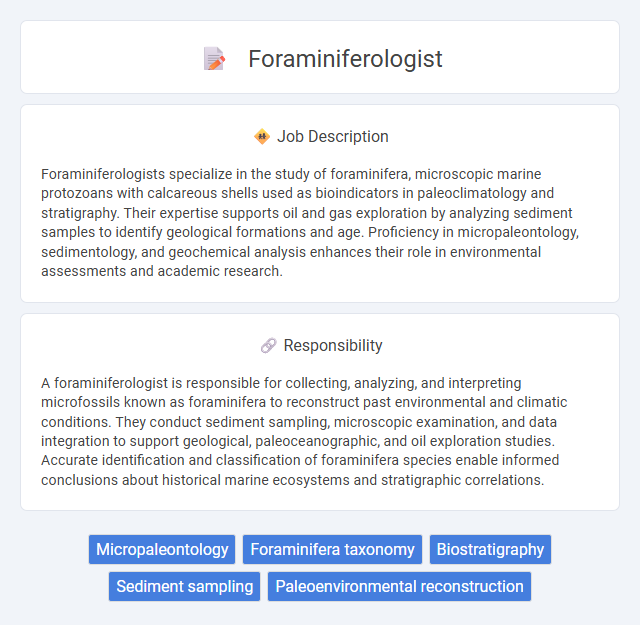
Foraminiferologists specialize in the study of foraminifera, microscopic marine protozoans with calcareous shells used as bioindicators in paleoclimatology and stratigraphy. Their expertise supports oil and gas exploration by analyzing sediment samples to identify geological formations and age. Proficiency in micropaleontology, sedimentology, and geochemical analysis enhances their role in environmental assessments and academic research.
Foraminiferologists are likely suited for individuals with strong analytical skills and patience, as the job involves meticulous examination of microscopic marine organisms. Those comfortable working in laboratory settings and with a keen interest in marine biology may find this profession rewarding. Candidates prone to boredom or who prefer fast-paced environments might struggle with the detailed and repetitive nature of the work.
Qualification
Foraminiferologists typically require a strong background in geology, paleontology, or marine biology, often holding a bachelor's or master's degree in these fields. Expertise in micropaleontology and proficiency in identifying and analyzing foraminifera species through microscopic techniques are essential qualifications. Experience with sediment sampling, data interpretation, and scientific research methods significantly enhances job prospects in academic, environmental, or oil and gas industries.
Responsibility
A foraminiferologist is responsible for collecting, analyzing, and interpreting microfossils known as foraminifera to reconstruct past environmental and climatic conditions. They conduct sediment sampling, microscopic examination, and data integration to support geological, paleoceanographic, and oil exploration studies. Accurate identification and classification of foraminifera species enable informed conclusions about historical marine ecosystems and stratigraphic correlations.
Benefit
Working as a foraminiferologist likely offers opportunities to contribute to climate change research and oil exploration, which may provide a sense of purpose and job stability. The specialized knowledge in microfossils could attract competitive salaries and funding for research projects. There might be chances for collaboration with geologists, paleontologists, and environmental scientists, enhancing professional networks and career growth.
Challenge
Foraminiferologists likely face the challenge of analyzing microscopic marine organisms that require precise laboratory techniques and advanced microscopy skills. The complexity of interpreting fossil records to understand past climates and environments may demand a high level of expertise and patience. Constant adaptation to new research methods and technologies could also pose ongoing difficulties in the field.
Career Advancement
Foraminiferologists specialize in studying microscopic marine organisms called foraminifera, crucial for biostratigraphy and paleoenvironmental analysis. Advancing in this career often involves gaining expertise in micropaleontology, pursuing advanced degrees such as a Ph.D., and acquiring skills in geospatial analysis and sedimentology. Opportunities for career growth include roles in academic research, oil and gas exploration, environmental consulting, and positions within government geological surveys.
Key Terms
Micropaleontology
A Foraminiferologist specializes in the study of foraminifera, microscopic marine protozoans crucial for micropaleontology research. This role involves analyzing fossilized foraminifera to reconstruct past climatic conditions, sedimentary environments, and biostratigraphy, aiding petroleum exploration and environmental assessments. Expertise in microscopy, taxonomy, and geochemical analysis of foraminiferal tests enhances the accuracy of paleoenvironmental interpretations and geological age dating.
Foraminifera taxonomy
Foraminiferologists specialize in Foraminifera taxonomy by identifying and classifying microscopic marine protozoans based on shell composition, morphology, and genetic data. Their expertise supports paleoenvironmental reconstruction and biostratigraphy through detailed analysis of foraminiferal assemblages in sediment samples. Proficiency in microscopy techniques and taxonomic databases is essential for accurate species differentiation and evolutionary studies.
Biostratigraphy
Foraminiferologists specialize in studying foraminifera, microscopic marine organisms crucial for biostratigraphy, which involves dating and correlating sedimentary rock layers. Their work enables precise identification of geological time periods by analyzing foraminiferal assemblages within rock samples. Expertise in biostratigraphy helps in oil exploration, paleoclimate reconstruction, and understanding Earth's historical geology.
Sediment sampling
Foraminiferologists specialize in analyzing microscopic marine organisms called foraminifera to interpret sediment samples and reconstruct past environmental conditions. Sediment sampling involves collecting marine or lakebed deposits using corers or grabs, providing crucial data for studying sediment composition, age, and paleoceanography. Expertise in sediment sampling techniques and sediment core processing is essential for accurate foraminiferal analysis and environmental assessment.
Paleoenvironmental reconstruction
Foraminiferologists specialize in studying foraminifera fossils to reconstruct past environmental conditions, providing critical data on climate change and marine ecosystems over geological time. Their expertise in analyzing microfossil assemblages enables accurate interpretations of sedimentary environments, sea-level fluctuations, and ocean temperatures. This paleoenvironmental reconstruction supports research in geology, paleoclimatology, and resource exploration by offering precise historical climate analogs.
 kuljobs.com
kuljobs.com